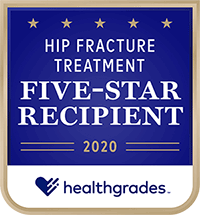Hip replacement surgery in Derry, New Hampshire

Parkland Medical Center's orthopedic surgeons use the latest minimally invasive technologies. Through a hip replacement surgery or hip arthroplasty, your orthopedic surgeon can alleviate hip pain, whether from injury by fractures or conditions like avascular necrosis. The result is better stability, mobility and function of your hip joint.
For more information about hip replacement surgery and other options to cure hip pain, call our Consult-A-Nurse® team at (877) 642-2362.
Our orthopedic specialists will diagnose your condition and decide whether hip replacement surgery or noninvasive treatments, like lifestyle changes or pain management, are the best approach to your care. If surgery is necessary, our orthopedic care program offers comprehensive care before, during and after joint replacement surgery to aid in a healthy recovery.
Types of hip replacement surgery we offer
Our orthopedic specialists provide comprehensive services for:
- Total hip replacement: Your orthopedic surgeon will replace the ball of the thigh bone and socket of the pelvis bone with prosthetic (or artificial) pieces, removing the damaged cartilage and bone and implanting the device.
- Anterior hip replacements: An anterior hip replacement is a minimally invasive technique where an orthopedic surgeon uses incisions in front of the hip to replace the joint.
- Hip resurfacing: Your surgeon will remove damaged bone and cartilage. But instead of removing the ball of the thigh bone, your orthopedic doctor will cap it with metal.
Hip replacement, recovery and rehabilitation
To aid your recovery after surgery, we provide physical therapy and rehabilitation, pain management and other services. These programs are offered as inpatient and outpatient services.
Candidates for hip replacement surgery
Schedule an appointment with our joint experts if you:
- Experience hip pain or stiffness after sitting for a long time or when getting out of bed
- Have pain, swelling or tenderness in the hip joint
- Hear or feel “crunching” in the hip joint
- Have tried other treatments, such as medicines and physical therapy, without success
